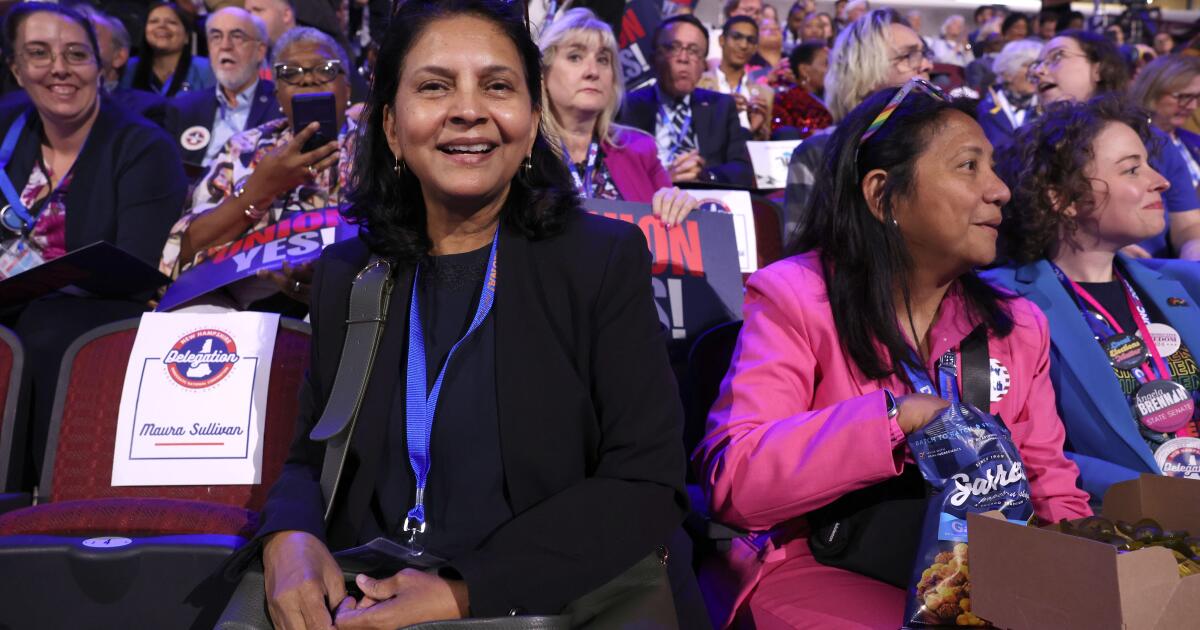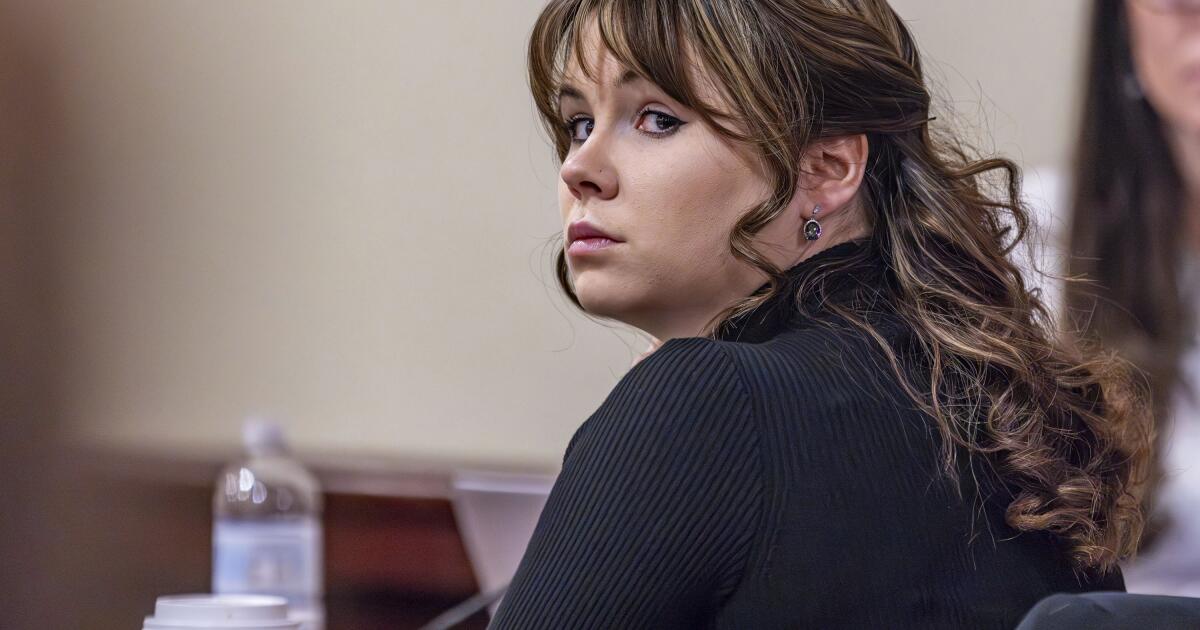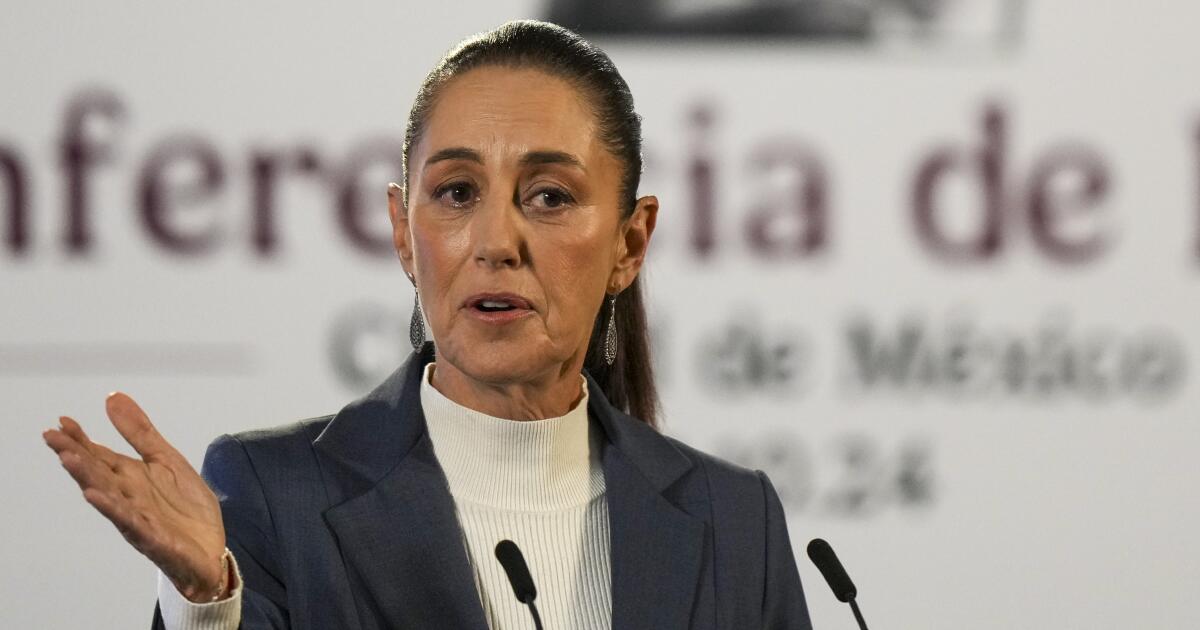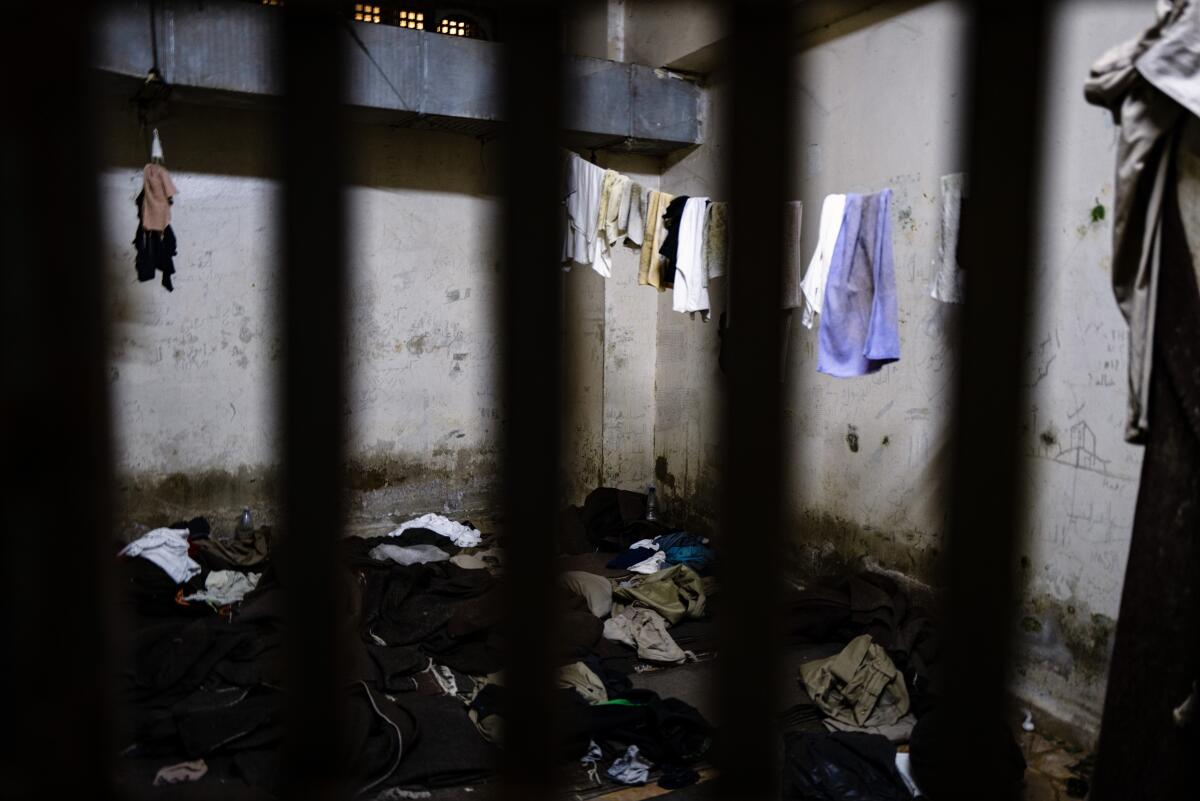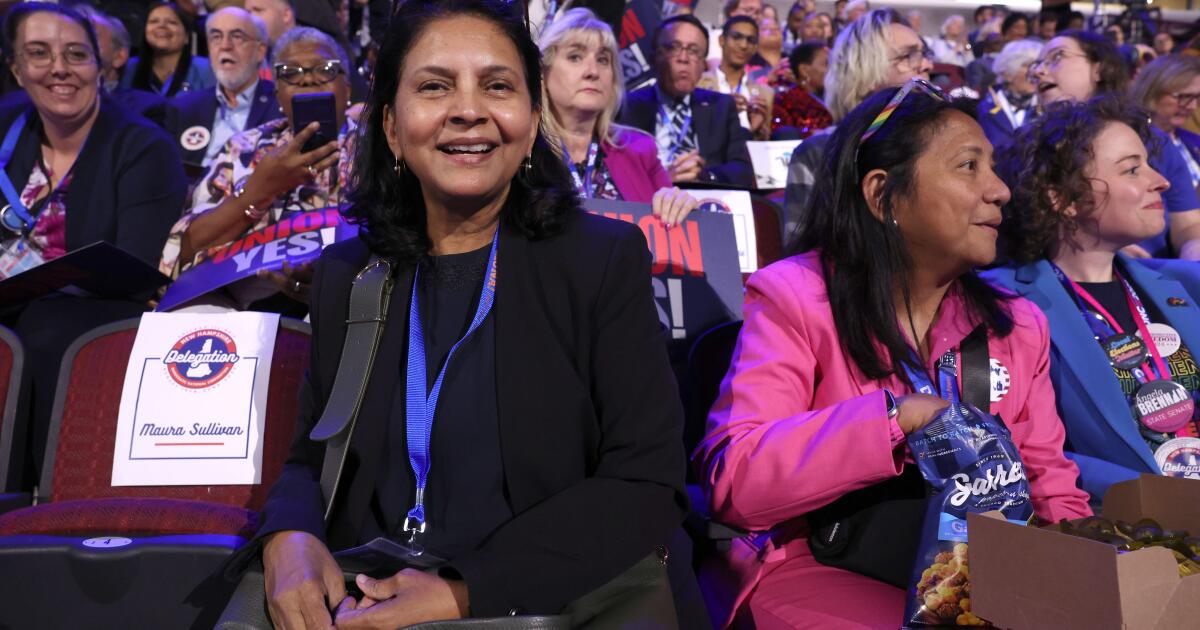
CHICAGO —
To Sumathi Madhure, feeling different just came with the territory in her new country. From the time she arrived in Nashua, N.H., at age 20, the sense would wash over her on long drives to get to an Indian restaurant or while pushing her cart around the grocery store.
“When I saw another brown person in the supermarket, it was so rare, I would just invite them to my home for dinner,” Madhure said with a chuckle. “Building a sense of place, building a community; it doesn’t just happen. It doesn’t happen if you don’t make the effort.”
Four decades later, her adoptive country has changed. Now Madhure — physical therapist, mother of two and local political dynamo — feels the small stream of her journey in America has flowed with many, many others into a mighty river.
She and other immigrants and others who have roots in India and other parts of South Asia gathered in Chicago this week for the Democratic National Convention — many expressing elation at the impending ascension of Kamala Harris as the party’s presidential nominee.
“To think that somebody who looks like her, somebody of South Asian descent, will be, perhaps, the president, be the most powerful person in the world,” Madhure began, pausing to visualize the image. “That’s just, it’s … well, it’s just beyond imagination.”
Madhure and hundreds of other “Desis,” as South Asians living abroad often refer to themselves, came together at a community center before Monday’s main convention session — responding with enthusiasm as politicos with similar roots described how their elections had marked a first for their own communities in Pennsylvania, North Carolina, Wisconsin, Arizona and other states.
“It doesn’t matter which color and which race you are; you still have to prove you are capable and worthy of the job,” said Madhure, a delegate. “To me, Kamala has proven she is capable and she can handle this job. But she needs to keep proving it.”
The potential political breakthrough sits with particular joy for the those with ancestry in South Asia — India, Nepal, Bangladesh, Pakistan, Afghanistan and other nations squeezed between Asia and the Mideast.
Harris was born in Oakland to a Jamaican father, Donald Harris, a professor emeritus of economics at Stanford University, and Shyamala Gopalan, an India-born academic who traveled to UC Berkeley to pursue a doctorate in nutrition and endocrinology.
In a meeting with Black journalists last month, former President Trump suggested that his new Democratic opponent had somehow been duplicitous, as he made the false assertion that she had identified as Indian American for years, only to “turn Black” later in life.
Black and South Asian supporters of Harris rolled their eyes at the notion of a white man dictating the identity of his multiracial opponent, calling it tone-deaf and racist. They didn’t have to repeat what history clearly shows: that Harris has identified for decades with both her Black and Indian roots.
“To try to put everyone into one specific box, saying that they can’t have demographics and values that fit other identities, that just doesn’t make any sense,” said Bianca Shah, 24, a Maryland resident and Indian American attending the convention. “There is so much blending of races and ethnicities in our country,”
“She’s both Black and Indian American,” said Shah, a healthcare consultant, pointing to multiple markers of Harris’ Indian heritage, starting with her middle name, Devi — Sanskrit for goddess.
“And she had an immigrant mother, who took her to India multiple times and instilled values and traditions in her that we all recognize,” Shah said.
Harris explained in 2003 to Asian Week that being from two cultures seemed perfectly natural to her as a child of California’s East Bay.
“I grew up with a strong Indian culture, and I was raised in a Black community,” she said. “All my friends were Black, and we got together and cooked Indian food and painted henna on our hands, and I never felt uncomfortable with my cultural background.”
Her experience is becoming increasingly common in the U.S., particularly in diverse states such as California. With the U.S. Census making it easier in 2020 for people to identify multiple racial and ethnic ancestries, the number of multiracial Americans blossomed to 33.8 million. That’s 10.2% of the total population.
Regardless of which candidate wins the presidential contest, a daughter of the South Asian diaspora will be in the new administration: The wife of Republican vice presidential nominee JD Vance, Usha Chilukuri Vance, will become second lady of the United States if the Republicans win. Usha Vance grew up in San Diego, the daughter of two academics who emigrated from India.
“Whether it’s Kamala Harris, whether it’s Usha Vance … there’s a pride that the community has arrived in the mainstream of American politics,” said Rep. Ro Khanna (D-Fremont), who represents one of California’s most heavily Indian American districts.
(Other Indian Americans also campaigned for president earlier this election cycle: former South Carolina Gov. Nikki Haley and Vivek Ramaswamy, a pharmaceutical entrepreneur, vied for the GOP nomination.)
There were fewer than 50 Indian and Asian Americans in elected office nationwide in 2016, according to Chintan Patel, executive director of the Indian American Impact Fund. By 2024, that number had increased to more than 300.
Congress already boasts five members with South Asian roots — Khanna and fellow California Democrat Ami Bera of Elk Grove, Pramila Jayapal (D-Wash.), Raja Krishnamoorthi (D-Ill.) and Shri Thanedar (D-Mich.). And with a Democratic-tilting seat open, Virginia state Sen. Suhas Subramanyam is likely to become the sixth House member of South Asian descent.
A community once focused more on academia and professional life feels increasingly comfortable running for office, said Karthick Ramakrishnan, a UC Riverside political science professor who studies Asian American voters. And, unlike earlier generations, Indian American candidates are now running without Anglicizing their names.
“We are so far away from being a post-racial society,” Ramakrishnan said, “but there does seem to be greater social acceptability for Hindus and Indians with distinctive names to run for office.”
Some South Asians have emblazoned a social media meme on T-shirts: “In Sanskrit, Kamala means LOTUS. In America, Kamala means POTUS.”
Ramakrishnan estimates there are about 2.1 million Indian American adults eligible to vote in the U.S. Some of that population is concentrated in battleground states such as Pennsylvania and Michigan.
Trump has won over some in the community with his warm embrace of Indian Prime Minister Narendra Modi, whose profile is viewed by some as not unlike his onetime American counterpart — strong men willing to defy political norms.
Ramaswamy is perhaps the highest-profile Indian American Trump surrogate. In campaign stops around the country and on social media, he pummels Harris as a big-government liberal who would do damage to “exceptionalism and merit.”
Such views were not shared by the Indian Americans assembled for Harris in Chicago this week. Some of them, like Harini Krishnan, got involved in politics at least in part out of disgust with the fury of Trump, particularly his tirades against the evils he claims some immigrants bring to America.
Harris’ late entry into the race unleashed a wave of support. A call of South Asian Women for Harris drew 10,000 participants. That, in turn, produced 500 new volunteers and $285,000 in donations, according to Krishnan, national director of South Asians for Harris.
The Indian American Impact Fund was one of the first organizations to endorse Harris in the hours after President Biden dropped out of the race. The group launched desipresident.com to “mobilize and empower the South Asian American electorate to elect the first Indian American President.” Its motto: “Kamala ke Saath” (We’re with Kamala).
In Chicago, journalists from South Asia have arrived to cover the convention and Harris, the woman who talks fondly about vacations in Chennai, south of Mumbai, where she would go on long walks and receive treats from her grandfather, a civil servant.
People in India have been making offerings to the gods and erecting small temples on Harris’ behalf, said Lalit Jha, chief U.S. correspondent for the Indian wire service PT1.
“People there are watching all this closely. They are excited about it,” Jha said.
Shah, of Maryland, recalls the fervent phone call she received from her “Ba” — her Indian-born grandmother, who now lives in the U.S. — on the night the news reported Harris had become the Democratic nominee: “She said, ‘Kamala — that was my mother’s name! Can you believe it?’”
It’s the first national convention for Deepa Sharma, a lawyer for small cities in the Bay Area. The California delegate said she felt a bond with Harris in part because the candidate knew her parents’ Indian restaurant in San Francisco. And Sharma attended the same law school — now known as UC Law of San Francisco — as the Democratic nominee.
Sharma said she remains anxious about a possible Trump victory. But the 36-year-old from Lafayette, Calif., said she feels hopeful in a way that takes her back to the first presidential election she voted in.
“This may sound corny, but in 2008 with Obama, I had that sense of hope,” Sharma said. “Now, I am excited again — to be able to organize around a sense of hope … and to feel that I am for something and not just against something.”
Times staff writer Seema Mehta in Chicago contributed to this report.
